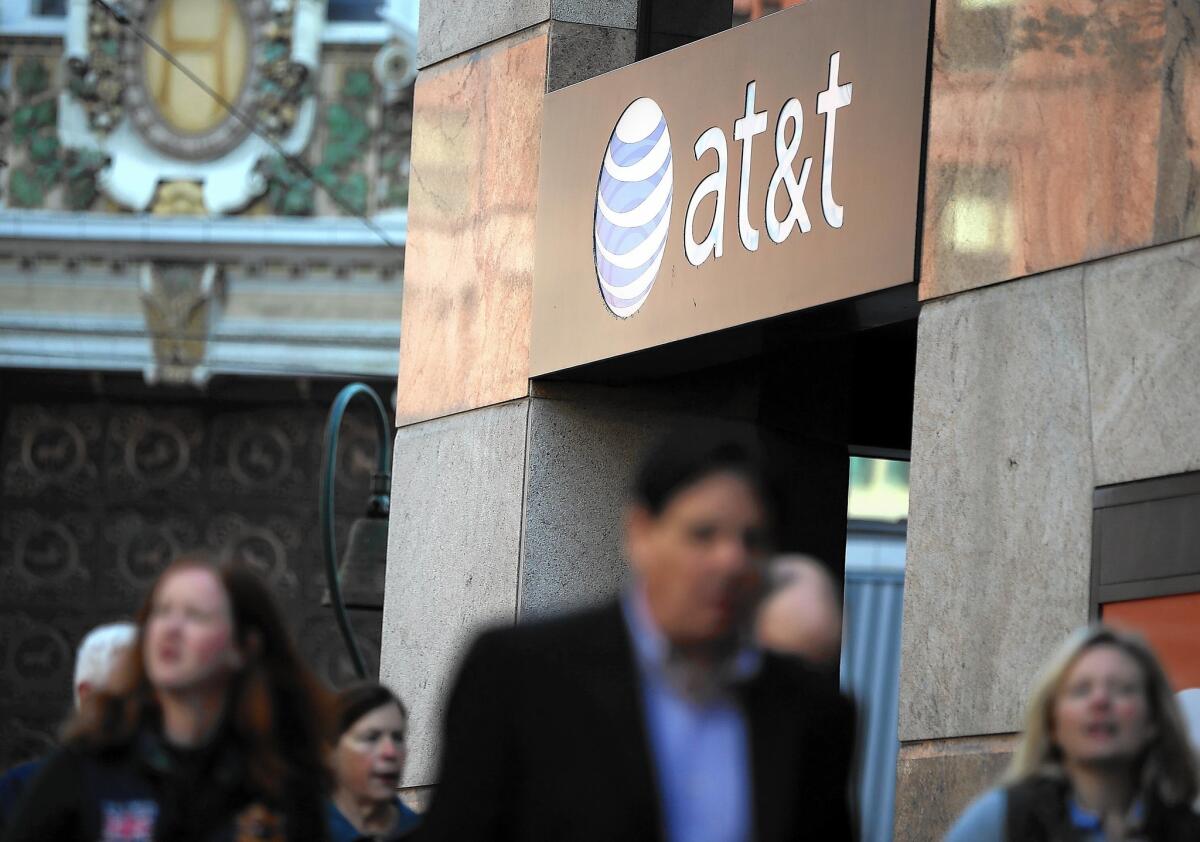Consumer groups say FCC conditions on AT&T-DirecTV merger fall short

AT&T is moving closer to becoming the nation’s largest pay-TV company, but conditions regulators placed on the deal don’t go far enough to protect consumers, advocates warn.
Consumer groups that have opposed AT&T’s proposed purchase of satellite giant DirecTV said Wednesday that they remained concerned the merger would not lead to lower rates for consumers or encourage competition.
This week, the U.S. Department of Justice gave a green light to the $49-billion deal, saying the tie-up did not appear to be anti-competitive. Separately, Federal Communications Commission Chairman Tom Wheeler said he would support the deal with several conditions designed to curb AT&T’s increasing clout in pay TV and Internet service.
FCC negotiators in recent weeks had sought a commitment from AT&T to more aggressively expand its broadband fiber network so that more homes have access to high-speed Internet.
A recent FCC study found that 55 million Americans — 17% of the population — still lack access to Internet service with sufficient speed to watch video or accomplish other data-intensive tasks. A third of the nation’s schools also lack adequate Internet service.
Increasing the availability of high-speed Internet connections has been a priority for the FCC. As part of the negotiations, AT&T agreed to expand its broadband networks.
“This additional build-out is about 10 times the size of AT&T’s current fiber-to-the-premise deployment,” Wheeler said in a statement.
Wheeler late Tuesday provided a preview of the conditions on the deal, but a detailed list was not made public. The four other FCC commissioners must now vote on the deal and conditions, and their approval could come within a few days — allowing AT&T to clear its final hurdle before it can close the deal.
“We are pleased that an order to approve our DirecTV transaction with certain conditions is circulating at the FCC,” an AT&T representative said. “We hope the order will be approved by the commission quickly, and we expect to close shortly thereafter.”
AT&T-DirecTV combined will serve 26 million customers in the U.S., including 1.5 million in the greater Los Angeles region. DirecTV currently has 20 million; AT&T U-Verse has 6 million.
Consumer organizations and a trade group representing small cable operators on Wednesday called for strengthening consumer protections.
“While acknowledging the effort made by Chairman Wheeler to protect existing competition, encourage fiber deployment and address affordability, no one should imagine that this has solved the underlying problem of our lack of competition,” said John Bergmayer, senior staff attorney at the consumer group Public Knowledge.
Although AT&T appears willing to increase its broadband fiber build-out in the U.S., the telecommunications giant could have accomplished that on its own without the prodding of the FCC, said Matt Wood, policy director for the consumer group Free Press.
“AT&T could take the money that they are using to wipe out a competitor and invest that to expand their own broadband network,” Wood said. “They didn’t need a merger for that.”
Public Knowledge had lobbied the FCC to urge AT&T to abandon its opposition to the FCC’s recently adopted Open Internet rules, which forbid Internet providers from treating Internet traffic differently. Such a concession did not appear to be part of the deal conditions, Bergmayer said.
“We also asked for AT&T to offer stand-alone Internet service, rather than it being part of a bundle, but I haven’t seen any indication that we are going to get that,” Bergmayer said.
He did applaud a program the FCC commissioners championed for AT&T to provide low-cost Internet service to low-income residents. Still, Bergmayer noted that the service being offered did not meet FCC standards for high-speed service.
As part of the deal terms, Wheeler sought safeguards to protect competition for the fast-growing market of Internet streaming services. One proposed condition would restrict AT&T from using high-speed Internet data caps in a way that would give its own video product an advantage over that of a competitor.
For example, in the past, other Internet providers have tried to encourage customers to watch video on their own sites by not counting those streams toward an established data cap. However, the FCC said it does not want AT&T to enforce two sets of rules to give its own service an advantage.
“In order to prevent discrimination against online video competition, AT&T will not be permitted to exclude affiliated video services and content from data caps on its fixed broadband connections,” Wheeler said in his statement late Tuesday.
Meanwhile, the American Cable Assn., which represents small operators, had asked the FCC to consider safeguards against fast-rising fees charged by cable sports channels. AT&T will inherit four regional sports networks now owned by DirecTV.
Wheeler’s proposed order “would lack key consumer protections and result in all pay-TV subscribers paying higher prices for their television service in major markets” where AT&T will own a sports channel, ACA Chief Executive Matthew M. Polka said in a statement.
Wall Street had been anticipating regulatory approval of the deal unveiled 14 months ago.
Shares of El Segundo-based DirecTV climbed 29 cents to $92.83 while shares of AT&T, headquartered in Dallas, slipped 30 cents to $34.27.
“I think it is a better deal than many people realize and provides considerable strategic value for AT&T,” said Matthew Harrigan, senior analyst for Wunderlich Securities, Inc. “DirecTV is one of the best marketing companies in the U.S. — they have done a great job advertising and providing an affordable luxury product. And having both mobile [phone] and video capabilities on a national basis is something that no one else will have.”
More to Read
From the Oscars to the Emmys.
Get the Envelope newsletter for exclusive awards season coverage, behind-the-scenes stories from the Envelope podcast and columnist Glenn Whipp’s must-read analysis.
You may occasionally receive promotional content from the Los Angeles Times.







